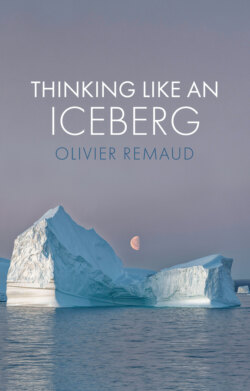Читать книгу Thinking Like an Iceberg - Olivier Remaud - Страница 15
Mirror, my beautiful mirror
ОглавлениеChurch and Noble’s journey is over.
More than a century later, a professional sailor is sailing in the Southern Ocean. His mind is made up: he leaves the first run of the solo round-the-world race in March 1968. It didn’t matter that he had a good chance of winning. He left the competition because he wanted to follow his own path, away from ‘civilisation’ and all its fakery. Using a home-made slingshot, he fires a brief message onto the deck of an anchored oil tanker: ‘I am continuing non-stop to the Pacific Islands, because I am happy at sea, and perhaps also to save my soul.’21 Despite his melancholy, he moves even further away from his family and friends and ventures towards Cape Horn and the Pacific, towards the Galápagos Islands.
Bernard Moitessier listens to the wind during his flight. He talks to the clouds and counts the raindrops on the sails. Dolphins accompany him for a few days and guide him off the reefs. Childhood memories come back to him. He cuts his beard every week to enjoy his own morning porridge clean-shaven and does yoga exercises in the cockpit of his small sailing boat. He travels towards peace and freedom. He lives in the present in order to ‘forget the world, its merciless rhythm of life’.22
The sailor fears that icebergs will cut his path. His nights become more chaotic than usual. He hardly sleeps at all. When he sees flocks of Cape larks flying around in the distance, he suspects that he is about to enter an area of coastal ice. He is wrong and manages to get around the drifting blocks. He writes: ‘Seeing an iceberg in fine sunny weather. It must be the most beautiful sight a sailor could lay eyes on, a thousand ton diamond set on the sea, glittering beneath the southern sun. It might be enough to last me the rest of my life.’23
Unlike James Cook, Moitessier did not cross the Antarctic Circle several times in an attempt to discover the continent that scholars and ministers talked about in the gilded halls of the British capital. He is not brought to a stop before an impassable wall, peopled by giants. When he returns and publishes his story, the collective imagination does not take off like a grass fire. The world is not enthralled by the ‘islands of ice’ floating in the Southern Ocean. His ‘diamond’ sparkles are not as mystical as those in Brendan de Clonfert. The allegorical tendency of polar romanticism is foreign to him. Unlike Noble, he is not one for rhetorical emphasis. Instead, he relishes simple words that speak of the possibility of a quite profane ecstasy.
He is afraid of icebergs. But he assumes that seeing just one of them will satisfy his wanderlust. He knows that many have wanted to pass through an imaginary mirror and have bumped into their own faces, like Narcissus in the clear water of a spring. Some have perished. He just runs away.
The iceberg is the mirror that the Moderns set up between them and nature to contemplate themselves. They imagine another side in order to get closer to their reflection. Self-esteem needs a magnetic North or South, a specular material.
But, over there, the cold does not become hot, the maps of the world do not invert, the compasses do not come to life like the chess pieces in Lewis Carroll’s tale of Alice’s adventures in Wonderland.
There is no mirror there.
